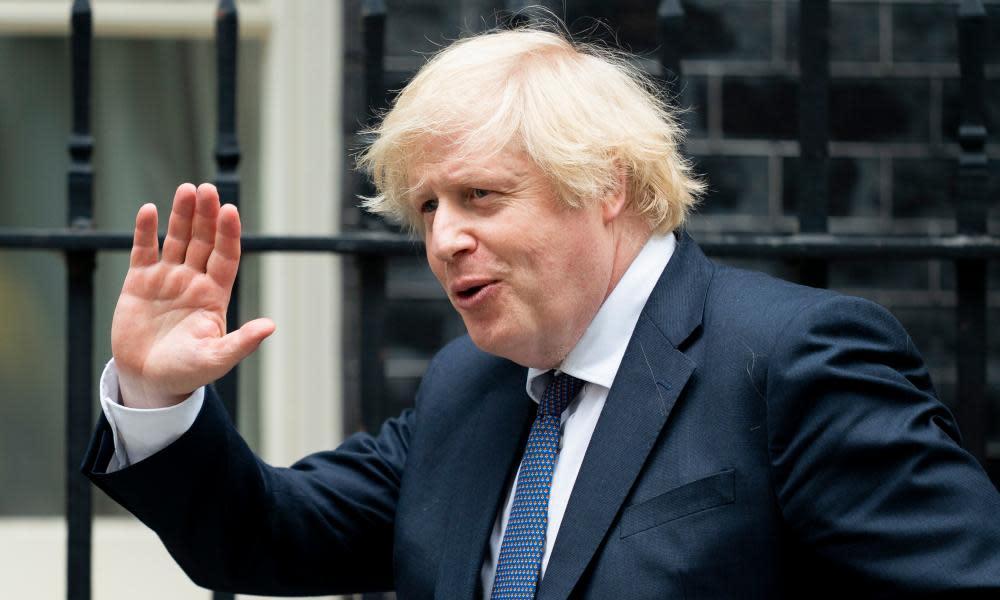Boris Johnson criticises Oxford decision to remove Rhodes statue

Boris Johnson has expressed opposition to removing a statue of Cecil Rhodes from Oxford University, in a rare newspaper interview in which he also said the jobs furlough scheme was not “healthy” for the economy in the long term and would end soon.
Speaking to the Evening Standard, the prime minister said he did not agree with the decision of Oriel College to take down its statue of the Victorian imperialist, as he was “in favour of people understanding our past with all its imperfections”.
Johnson said: “I want to build people up, not tear people down. If we go around trying to Bowdlerise or edit our history in this way, it’s like some politician sneakily trying to change his Wikipedia entry.”
Before the reopening of pubs, restaurants and other businesses in England this weekend, Johnson urged people not to be reckless, warning that more local lockdowns could follow like that imposed in Leicester.
“Do not undo the sacrifices you have made with reckless behaviour,” he said. “The public need to stay alert and realise that the threat is not over. Follow the guidance and behave responsibly so that this virus cannot re-emerge in communities across the country.
“We are working through our roadmap but this could easily be undone. We do not want to see businesses have to close again. Here in London the virus seems to be very much in retreat. But as I said yesterday, the shark is still out there in the water.”
Johnson will give a press conference at Downing Street on Friday.
He said he and his fiancee, Carrie Symonds, would be going out themselves this weekend, while giving no detail. “We have plans, we are definitely going to mark the event.”
He also said he would take advantage of barbers and hairdressers reopening. “I will be having a haircut as soon as I can. It’s booked.”
On the issue of the furlough scheme, Johnson indicated it would end as scheduled in October, even for sectors of the economy that will still be badly affected by coronavirus, such as theatre and the arts.
Saying he was going to be “very, very blunt”, Johnson hinted that he wanted to move beyond the measure.
“The best way forward for us now is to work together to beat the virus and get the economy back on its feet,” he said. “But I think people need to recognise that the particular restrictions that furlough places on you are not, in the long term, healthy either for the economy or for you as an employee.
“You are keeping people in suspended animation. You are stopping them from actually working. I am being absolutely frank with you, we are pushing it out until October but in the end you have got to get the economy moving.”
Johnson said China’s imposition of a draconian security law on Hong Kong was “plainly an unacceptable breach” of the 1997 handover agreement between London and Beijing, and he said he would examine the role of Chinese firms in the UK, such as Huawei in the rollout of the 5G mobile network.
“On Huawei, I’m not against investment in this country,” he said. “This is an open market economy. But I don’t want to see our critical national infrastructure at risk of being in any way controlled by potentially hostile state vendors. So, we have to think very carefully about how to proceed now.”
He defended his decision to replace Sir Mark Sedwill as national security adviser with David Frost, currently his chief Brexit negotiator. Frost is a former mid-level diplomat with little specific security experience.
Speaking during a Commons debate on the subject on Tuesday, Theresa May questioned why someone with “with no proven expertise” had been put in the role, in a rare direct attack from the former prime minister.
Johnson said: “I didn’t hear what she said but I have the highest admiration for David Frost and he will do an outstanding job. And by the way, you know he is a very distinguished diplomat who has served in many, many different capacities.”

 Yahoo News
Yahoo News 
